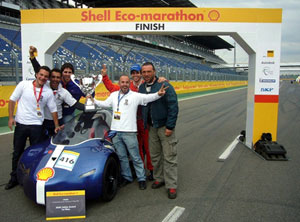1st Prize for TUCer team at the Shell Eco Marathon 2010 at EUROSPEEDWAY, Lausitz, Germany.
TUCer (Technical University of Crete Eco Racing Team) designs and constructs a prototype, low consumption urban vehicle.The first prototype was constructed on May, 2008. After two years of development the new vehicle ER II was ready to race on May, 2010
TUCer team participated until now at the following competitions:
- 2010, May: Shell Eco Marathon, EUROSPEEDWAY, Lausitz, Germany (1st Prize at the ADAC Safety Award)
- 2009, May: Shell Eco Marathon, EUROSPEEDWAY, Lausitz, Germany
- 2008, May: Shell Eco Marathon, Nogaro, France
The principle of the Shell Eco-marathon is simple: to design and build a vehicle that will use the smallest amount of fuel and produce the fewest emissions possible.
Teams can enter futuristic prototypes - streamlined vehicles where the only design consideration is reducing drag and maximising efficiency, or UrbanConcept vehicles - built to conventional road-going vehicle criteria.
Conventional fuels such as diesel, petrol and LPG, as well as alternative fuels such as solar, electric, hydrogen and biomass can power the vehicles. As long as the teams adhere to safety rules, the source of fuel is limited only by their imagination.
The Shell Eco-marathon is a major educational project. Students are encouraged to reflect on potential solutions to both current and future transport and energy challenges and to explore ideas for more sustainable mobility. The objective is twofold: to help technical institutions secure talent for their technical courses and to promote future technical careers.
By participating in the Shell Eco-marathon project young people get the opportunity to examine fundamental questions as:
Teams can enter futuristic prototypes - streamlined vehicles where the only design consideration is reducing drag and maximising efficiency, or UrbanConcept vehicles - built to conventional road-going vehicle criteria.
Conventional fuels such as diesel, petrol and LPG, as well as alternative fuels such as solar, electric, hydrogen and biomass can power the vehicles. As long as the teams adhere to safety rules, the source of fuel is limited only by their imagination.
The Shell Eco-marathon is a major educational project. Students are encouraged to reflect on potential solutions to both current and future transport and energy challenges and to explore ideas for more sustainable mobility. The objective is twofold: to help technical institutions secure talent for their technical courses and to promote future technical careers.
By participating in the Shell Eco-marathon project young people get the opportunity to examine fundamental questions as:
- What technical solutions will make mobility sustainable and available to all?
- What behaviors must we adopt in order to manage our energy needs better?
- How can we maintain our current levels of comfort and enable others to reach comparable levels, while at the same time ensuring a viable and acceptable environment for future generations?
While not claiming to have the definitive answers to these questions, Shell offers young people who are interested in the world of technology, energy and transport a unique opportunity to work in a hands-on manner to identify possible solutions to such critical, global challenges.
More information about TUCer (Technical University of Crete Eco Racing Team)
| < Zurück | Weiter > |
|---|







